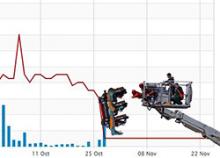DWF has begun trading on the London stock exchange, triggering windfalls for the partners and a fortune for the management.
The largest law firm to float in the UK began trading on Friday morning at 122p a share following a valuation of £366m. As part of the deal, MP Andrew Leitherland received £8.7 million of shares. Sir Nigel Knowles, who snagged a knighthood for turning DLA into a global behemoth before taking a retirement job as DWF's chairman, got shares worth £3.3m.
Equity and fixed share partners have all been allocated a chunk, as has DWF's Employee Beneficiary Trust ('EBT'), which can dole out shares to anyone else deemed worthy. In total, members and the EBT own approximately 80% of the shares, worth £296 million. But to prevent the partners cashing in their entire holdings at 8am today and running for the Tuscan hills, most of it is locked up and will be drip-fed to them - or withheld entirely if they don't work hard enough.
On day one, DWF partners and the EBT will be able to sell £20.2 million of their shares. But after that, members have to wait. On 30 April 2020, when the firm's first post-float financial results are announced, they will be allowed to sell 20% of their remaining shareholding. For the next four years, after each subsequent announcement in April of the financial results, they will be permitted to sell 10% of their shares and a further 10% if their individual performance has been deemed up to snuff.
DWF is also issuing 61.5 million new shares, which are expected to raise £75 million for the business. In a further boon for partners, £19 million of that will be used to repay a portion of the money they paid to DWF as capital contributions. "Up to" £10 million will be used to improve IT, and the remainder, around £40 million, will be used for general business use (limos and jewellery) and as a war chest to acquire other firms (Clifford Chance).
Around 1,800 other employees are set to receive shares via the EBT, which will also bestow shares on high achievers or to attract lateral hires. But there's an incentive not to sit back. The five year lockup mechanism applies to new shareholders at the firm, too. If a shareholder decides to ditch DWF within the lockup period, they will be permitted to sell their shares if they are deemed a "good leaver". But if they are found to be a "bad leaver", their shares will be "clawed back".
The IPO was very much in the minds of staff responding to the RollOnFriday Firm of the Year 2019 survey. A few said they would consider leaving if it was a car crash or didn't happen. Others were excited by the prospect of being owned by Canadian pension funds, but some said that promotion rounds and raises were on hold in the run-up, and that they expected them to unlock sharpish once DWF became a soaraway stock.
Chief executive Andrew Leaitherland said the IPO marked "the start of the next phase of DWF’s evolution", and that its fortune would be spent "attracting and retaining the best talent, investing in technology and carrying out targeted M&A". In the meantime, he can buy most of Manchester.













Comments
311
343
"Others were excited by the prospect of being owned by Canadian pension funds." Dro;;. Very droll.
344
322
"Windfall for DWF equity partners..."
There, fixed it for you.
323
351
Has the lesson from Slater & Gordon gone unheeded. Only a fool would invest in this. Just watch the best people leave DWF in the coming years.